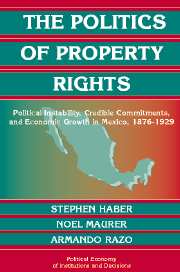 The Politics of Property Rights
The Politics of Property Rights Published online by Cambridge University Press: 02 December 2009
The political instability of 1911–29 did not have a long-term impact on mining. There was a short-term decline in output during 1913–17. That downturn, however, was short-lived and was mostly caused by the interdiction of the railway system by warring factions, which made it extremely difficult to get ore and coal to smelters, or metals to the United States. In addition, during the early years of World War I, the markets for Mexico's major minerals were so depressed that, even had there not been a revolution, Mexico's mines could not have been run at a profit.
By 1918, when the railways returned to functioning and international prices recovered, Mexico's mining companies began to get back to work. They quickly resumed their pre-1911 growth path and Mexico ended the 1920s producing more copper, silver, and lead (its three most important mineral exports) than it had produced in any year before 1911. When Mexico's mining boom came to an end, it was the product not of the political instability of 1910–29 but of the Great Depression, which decimated metals prices.
Four reasons explain why the mining sector was able to weather political instability. First, the amount of technical knowledge required to run a modern mining and refining enterprise was extremely high, and Mexico's warring factions, as well as the governments of the 1920s, did not have the ability to run the mines and smelters themselves.
To save this book to your Kindle, first ensure [email protected] is added to your Approved Personal Document E-mail List under your Personal Document Settings on the Manage Your Content and Devices page of your Amazon account. Then enter the ‘name’ part of your Kindle email address below. Find out more about saving to your Kindle.
Note you can select to save to either the @free.kindle.com or @kindle.com variations. ‘@free.kindle.com’ emails are free but can only be saved to your device when it is connected to wi-fi. ‘@kindle.com’ emails can be delivered even when you are not connected to wi-fi, but note that service fees apply.
Find out more about the Kindle Personal Document Service.
To save content items to your account, please confirm that you agree to abide by our usage policies. If this is the first time you use this feature, you will be asked to authorise Cambridge Core to connect with your account. Find out more about saving content to Dropbox.
To save content items to your account, please confirm that you agree to abide by our usage policies. If this is the first time you use this feature, you will be asked to authorise Cambridge Core to connect with your account. Find out more about saving content to Google Drive.